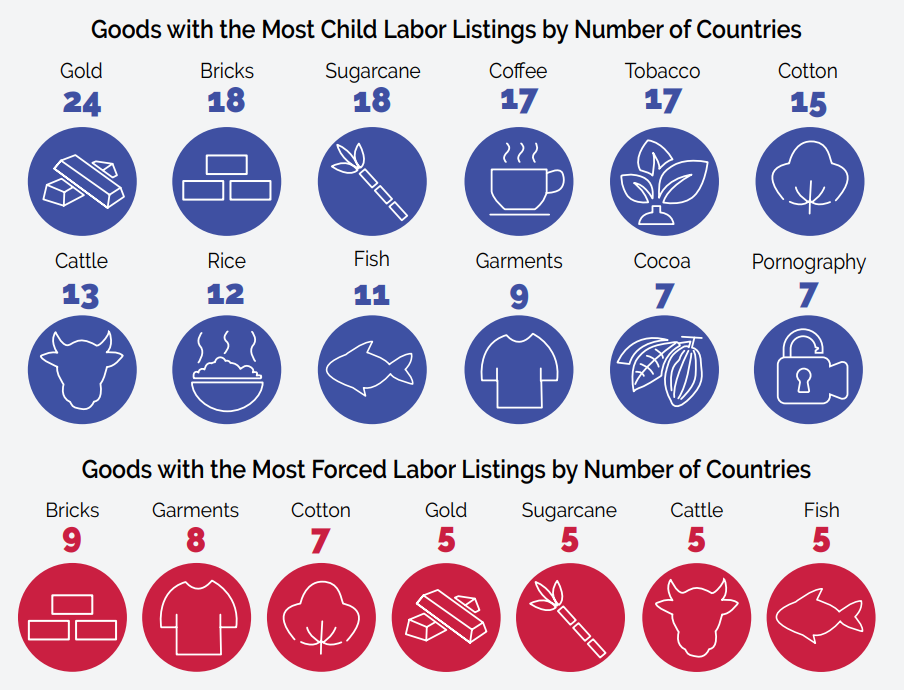The retail and fast-moving consumer goods (FMCG) sector has some unique characteristics. From the consumer perspective, there’s frequent purchases, with little or no effort to select products, low prices, short shelf life and rapid consumption.
From the business perspective there’s high volumes, low contribution margins, extensive distribution, and high stock rotation. These characteristics can have a huge negative impact on the people within its operations and supply chains and, can in and of itself cause and contribute to modern slavery.
See below how many retail and FMCG goods are included in the list compiled by the United States Department of Labour.

Source: US Department of Labour, 2022 List of Goods Produced by Child and Forced Labour
Combine this prevalence with consumers and activist groups demanding action on human rights and modern slavery, this has resulted in many retail and FMCG organisations attempting to address this issue for some time now. Whilst the sector may not always get it right, there are some key initiatives that other sectors can certainly learn from.
The UN Guiding Principles and the OECD Guidelines on human rights due diligence call for meaningful engagement with affected stakeholders. Many retail and FMCG organisations have adopted tech solutions, such as Ulula worker voice technology, which empowers anonymous real-time communications within supply chains to reduce risk, respond to challenges, exceed compliance requirements, improve productivity and help advance working conditions around the world.
Audits can help with identifying and managing risk, but their scope is often limited. To meaningfully take action on modern slavery, audits should be used alongside more comprehensive human rights due diligence. This is often called a ‘beyond audit approach’.
Examples include M&S with human rights training for procurement teams and reviewing data from worker voice technology. Mars’ Next Generation Supplier programme which uses tools, technologies, and an innovative collaboration model to help suppliers deliver better results for people in their workplaces. Unilever work directly with partners to build skills and develop capabilities across important issues such as eliminating forced labour, avoiding child labour, paying fair wages for reasonable working hours, management systems, fire safety, and the environment.
Finally, my favourite (because I love chocolate!) Tony’s Open Chain, which is an industry-led initiative that helps chocolate brands transform their cocoa supply chains. Members include Tony’s Chocolonely, Aldi, Ben & Jerry’s, Flower Farm, Jokolade and Albert Heijn.
The chocolate companies work together through Tony’s Open Chain, setting a new industry standard to end modern slavery and illegal child labour in cocoa. By adopting the five Sourcing Principles they drive structural change towards a more equally divided cocoa chain. These principles are traceable beans, a higher price, strong farmers, the long term productivity and quality.
Interested in how we can help your organisation with your modern slavery strategy? Get in touch with our expert Anna.
Explore how the healthcare industry can fight against modern slavery.
Discover how the built environment can fight against modern slavery.
See how the utilities sector can fight against modern slavery.

Anna Cantwell
Senior Consultant
anna@actionsustainability.com

This was posted in All Topics, Modern Slavery & Human Rights
Lead Consultant Helen Carter, uncovers how organisations are integrating sustainability considerations, stakeholder engagement, and innovative methodologies to identify, assess, and prioritise sustainability risks.
Read Article
This was posted in All Topics, Modern Slavery & Human Rights
Senior Consultant EJ Allen explores the critical role of modern slavery due diligence in strengthening supply chain resilience. Explore the risks posed by forced labor and exploitation, the legal compliance requirements, risk mitigation strategies, and the importance of reputation management.
Read Article
This was posted in Modern Slavery & Human Rights
Social audits are a key component of most modern slavery due diligence processes. Senior Consultant, Anna Cantwell uncovers how effective audits, worker engagement, and collaboration can contribute to building resilient and ethical supply chains.
Read Article